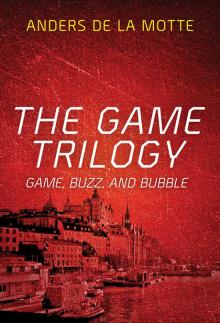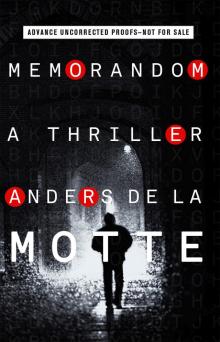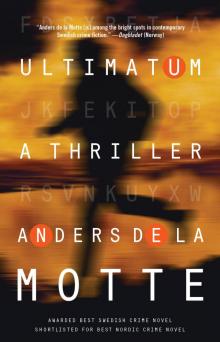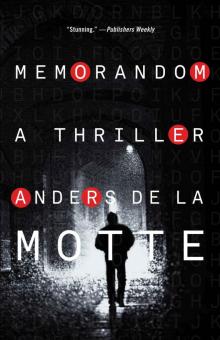- Home
- Anders de la Motte
Ultimatum Page 3
Ultimatum Read online
Page 3
“Aren’t you going to ask me how I am or what I’ve been doing for the past six months?” Julia smiled, but Wallin’s expression didn’t change. “Anyway, you didn’t have to ask me to lunch. Most of it’s already been in the papers.”
That was more accurate than she would have liked. No more than a couple of days had passed since her visit to the Forensic Medicine Unit, but the public already knew almost as much as she did. The evening tabloids loved summer murders, and their reporting followed the usual pattern. Yesterday there had been a few grainy pictures of police boats and divers, and a map covering the whole centerfold. Where the body parts were found. Quotes from a source with inside knowledge of the investigation, obviously her own boss, and today she had just read the assortment of speculation and confident assertions from the usual academic detectives who had never seen a dead body in real life.
This could be connected to the criminal underworld. Statistically, the killer is likely to have been known to the victim, and her personal favorite: Dismemberment is a way for the killer to get rid of the body.
Wallin put what looked like a perfectly judged mix of beef patty, potato, sauce, and lingonberry preserve in his mouth. He chewed slowly as he raised his eyebrows quizzically.
“The victim, according to the latest we’ve got from the pathologist, is a white male between thirty-five and forty-five,” Julia said. “Just over one meter eighty centimeters tall, with short, dark brown hair. We may need to take that last bit with a pinch of salt. The crayfish didn’t leave much of his scalp.”
She fell silent. Wallin went on chewing, as implacable as ever. If the malicious rumors about his career contained any truth at all, there certainly wasn’t any sign of it in his behavior or appearance. His boyish features, emphasized by his perfectly combed side parting, formed such an abrupt contrast to his tailor-made three-piece suit that it almost jarred. He looked like a boy dressed up as a grown man, he always had. Previously only the most deranged of his colleagues had made fun of that. Only in recent months had she heard his nickname spoken out loud in the corridors of Police Headquarters. Even by some of her superiors.
Manboy.
She didn’t approve. Wallin was a talented policeman and an equally skilled administrator. But now others were enjoying the fruits of his labors, and the whole of his handpicked team had been transferred to the staff of the national police chief. All but Wallin himself, which most of his colleagues took to mean that he was going to be sidelined somewhere and never heard from again. She hoped that interpretation didn’t turn out to be correct.
“Have you been able to identify the body?” Wallin wiped his mouth on his napkin with exaggerated thoroughness.
“Not yet. We’ve checked for a match on the missing persons register: nothing there. His hands haven’t been found, so we haven’t got fingerprints. Same with teeth and dental records. We’re expecting DNA results from the National Forensics Lab by tomorrow at the earliest but probably on Friday, maybe even Monday. It’s not at all certain that they’ll be able to get any DNA. The body was in a very poor state.”
“And the face? Could you release a photograph to the press? Ask the general public to get in touch with tip-offs?”
Julia shook her head.
“The perpetrator had a go at the face with a chain saw. It’s completely unrecognizable.”
At least for the time being, she added to herself. She considered telling Wallin about her backup plan. Let him know how good she was at her job. Six months ago she would have done so without hesitation. But for some reason she decided to wait. Besides, she wasn’t even sure if what she was considering could actually be done.
“The experts in the tabloids are right, then,” Wallin said. “You’ve got a real challenge on your hands with this case. You know the statistics as well as I do. Only six out of ten dismemberments get cleared up. A sixty percent chance that quickly shrinks to single digits if you don’t manage to identify the body. And what would that do to your solving rate?”
The question seemed to be rhetorical, because Wallin turned his attention back to his food without waiting for an answer. Julia stuck her fork into her Caesar salad, took a mouthful, and discovered at once that something was missing from the dressing. It took her a few seconds to work out what. Anchovies. What chef would make a Caesar salad without using anchovies? Presumably one who thought he could get away with it.
The murmur of conversation in the restaurant rose in volume as more and more diners sat down at the tables. One or two suits, but mostly neon-clad laborers. People who, like Wallin, had a preference for traditional Swedish fare. Personally she preferred Asian. Lighter food: less flour, cream, and potato.
Wallin went on eating calmly. He was evidently planning to make her ask.
“So, tell me! Why is the minister of justice’s special investigator so interested in an old dismembered body?”
Wallin took a sip of his lingonberry drink and then carefully wiped his mouth again before leaning over the table.
“As you may be aware, the party has its training center in Källstavik. Several of the higher-ups rent houses on the grounds with access to the water, including the minister of justice’s father-in-law, Karl-Erik Cedergren. A dismembered body in the water they go swimming in, just in time for the holidays, is a little uncomfortable, particularly when the tabloids are wallowing in the details. The minister’s phone is going to start ringing, and when it does, I want to be prepared.”
“You want me to keep you informed?”
He smiled at her, a crooked, slightly mocking smile. Yet Julia still found herself smiling back at him. She’d missed this. Missed their rather peculiar sense of camaraderie.
The first time she’d met Oscar Wallin was around five years ago. She’d been part of the team investigating an unusually grisly murder in the southern suburbs of Stockholm. The victim was a small-time informer, and the method resembled another case that National Crime was investigating. Wallin was involved in his capacity as National Crime’s informant handler, and he was the only one who didn’t shake his head when she, unlike all the alpha males on the investigative team, declared firmly that they were dealing with two different perpetrators and that the second was simply a copycat. When the forensics experts proved her right a week later, Wallin bought her lunch. Over a meal of stuffed cabbage leaves he asked how she could have been so certain. She explained that the two crime scenes were just too different. The perpetrators had moved through the rooms in different ways and did things in a different order. And, unlike all the other police officers she knew, Wallin seemed to be in no doubt about her abilities.
Two months later he had called her and asked her to take a look at the security camera footage of a robbery and compare it with videos of various suspects and images from where they lived. She had found it relatively easy to point out those whose movements and rhythms matched the robbers’. Not long after that, she was suddenly promoted to detective inspector and given her own room in the front corridor of the crime unit, and she slowly began to make a name for herself within the force. And even if Superintendent Pärson claimed the credit for having discovered and coached her, Julia was well aware of who her real mentor was.
Wallin had continued to contact her every now and then: sometimes to find out how she was getting on, but more usually to give her a new challenge or ask for discreet favors. Most recently last Christmas.
“By the way, what happened about that trace of blood I found in Sophie Thorning’s apartment?” she said. “Did it help prove that someone else had been there the night she jumped?”
Wallin shook his head. “It turned out to be her own blood. I thought I’d told you that.”
“No, we haven’t spoken since I sent you my report. Not so much as a Christmas card by way of thanks.” She pretended to be upset. That would have made most guys blush and start to stammer their apologies. She knew she looked pretty good and
that this could occasionally be used to her advantage. But that sort of trick never worked on Wallin, which was another reason why she respected him. The only way to get Wallin’s attention and respect was by delivering results.
“I’ve been busy,” he said, without sounding the slightest bit apologetic, but more like he was chastising her for not realizing something so obvious.
“And the post of national police chief . . . ?”
Julia regretted saying it before it was even out of her mouth. Wallin’s mouth narrowed to a thin line.
“If I’m allowed to say what I think, the minister of justice picked the wrong person,” she added quickly.
Wallin sat silent for a few seconds, as if he was trying to work out how truthful her statement was. The thin line curved into a controlled smile.
“Thanks. Obviously, I’m aware that I’m being talked about. That people are saying I’ve been passed over, even that I’m heading toward the exit.” Wallin shook his head gently. “Success breeds enemies, Julia. You’ll find that out. Colleagues who are envious or bitter, who take pleasure in the few occasions when you fail, and who don’t hesitate to spread all manner of rumors.”
He leaned forward slightly and smiled more broadly, revealing his canine teeth.
“But I’m still here, as you can see. I’ve still got an office just a few meters from the minister’s, and sooner or later everyone who’s underestimated me will have to pay for that.”
He held her gaze for a few seconds. Then straightened up.
“Enough about that. There’s another reason why I wanted to talk to you. It’s about your new colleague . . .”
Wallin wasn’t the sort to do air quotes, but Julia thought she could almost see his fingers twitching on the checkered tablecloth.
“Omar Amante, lawyer, excellent grades at university, foreign service. If the predictions are correct and the opposition win this autumn’s election, his stepfather will replace Jesper Stenberg as minister of justice. Which makes Amante junior the golden boy. The question is: Why has he suddenly appeared from nowhere to join you in the Violent Crime Unit?”
“What do you mean?” Julia frowned. A police car drove past outside in the street. Flashing lights and sirens. The sound bounced between the buildings, drowning out everything else for a few seconds.
“Amante left his job with Europol last Christmas,” Wallin said as soon as the car had passed. “Six months before his contract was due to finish. One unconfirmed rumor is that he fell out with his boss. That there was some sort of scene that got hushed up. No one seems to want to talk about it. Either way, Amante disappeared off the radar for a few months. He wasn’t in Sweden, and he wasn’t at Europol’s offices in The Hague. Then he suddenly shows up in Stockholm and lands in the middle of a murder investigation that has vague connections to the party. The same party that his stepfather is doing his utmost to eject from power.”
Wallin leaned across the table again and lowered his voice.
“You’ve been saddled with Amante for a reason. And I’d dearly love to know what that reason is.”
• • •
Sarac zipped his jacket up and pulled his hat as far down on his forehead as he could before looking at his watch again. Thirty seconds. This was madness. He was mad. Which made it all the more ironic that he was trying to escape from a mental institution.
He put his fingers on the door handle. Five, four, three, two, one . . .
He stepped out into the corridor. Walked without hesitation straight toward the door to the stairwell, not falling for the temptation of looking up at the spherical camera above it. The change of shift was under way and the likelihood of any member of the staff looking at the picture from the camera for the few seconds it took him to pass it wasn’t very high. At least that was what he tried to tell himself to calm his pounding heart. Panic and fear were being temporarily held at bay by the tranquilizer he had swallowed just over half an hour ago.
This isn’t a good idea, the voices in his head whispered. But the happy pills had rendered them impotent. Easier to ignore. At least for the time being.
The doors to the ward were always kept locked, and he fiddled with the key, got it into the lock, but couldn’t turn it. He jerked and twisted it. For a fraction of a second he considered giving up. Going back to his safe little room, forgetting everything, and carrying out his original plan. Gulp down all those sleeping pills at once, tonight. Put an end to everything. But he knew that was impossible. He had to know the truth, had to know how everything fit together.
He suddenly felt the lock give with a clicking sound. The key Eskil had given him was evidently a cheap copy that took a bit of fiddling to make it work. He guessed that his new pen pal Frank had paid for it, just as he had paid for Eskil’s services.
Sarac headed down the marble staircase, all the way to the basement. He managed to unlock the heavy steel door almost at once and found himself in a bare, low-ceilinged corridor. Another glance at his watch. Two minutes and ten seconds had elapsed since he began his escape. He quickened his pace, trying to make use of the surplus adrenaline while it lasted.
He stopped at the door marked District Heating. Once again he used the copied key to unlock the door and stepped inside a large, warm room full of pipes and meters. He stood still for a couple of seconds to get his bearings. Then he identified the incoming pipes and followed them to the far end of the room, just as he had been instructed to do. Another heavy door, and behind it a tunnel where the pipes disappeared into the darkness. He took a few steps forward. Felt for the circuit breaker but couldn’t find it.
Suddenly the door behind him closed and everything went pitch-black. He was seized by panic as it broke through the chemical barrier protecting him from his anxieties and gripped his rib cage.
Why are you doing this, David? the voices whispered. Why?
He put his hand against the concrete wall, leaned forward, and took a couple of deep breaths. He caught the vomit when it was halfway up and forced it back down into his stomach. He stood there for a minute or so until the panic attack subsided. Then he straightened up and felt across the wall with his hand. His fingers nudged the circuit breaker and he turned it. A mechanical click echoed off the concrete walls of the tunnel and a sequence of fluorescent lights flickered slowly to life.
What if this is a trap? What if someone’s waiting for you out there? Someone who wants revenge.
Sarac stopped. He’d had time to think through that scenario over the past few days. That and a handful of others. The possibility that his secret pen pal, the man calling himself Frank, didn’t actually exist. That everything, the letter and photographs alike, was a fabrication intended to lure him from his hiding place. But for some reason during their brief correspondence he had become convinced that this wasn’t the case. Besides, he had managed to persuade Eskil to take a surreptitious photograph of Frank, and had studied it carefully on the cracked screen of the nurse’s phone.
Frank definitely existed. What he said was true. Someone had managed not to face up to his responsibilities so far. Had bought himself free from guilt. Had saved his own life and career by betraying Sarac.
Justice.
That was why he was now heading, for the first time in several months, out into the wide world. Exposing himself one last time to the frightening world that he no longer felt able to deal with.
Even if he was wrong, if all this turned out to be a trap after all and Frank or someone else was waiting out there in the darkness to kill him, then they’d only be doing him a favor.
He put his hand in his pocket and closed his fingers around the bag of pills. Twenty-five of them now. Enough for him to pull the emergency cord whenever he wanted to.
It took him seven minutes to make his way through the tunnel and climb up the steps to the boiler room at the other end. The combination of the exertion and the heat in there left him dre
nched in sweat. He hesitated a few seconds before cautiously nudging the door open. To his left lay the main building and the illuminated yard that he had just passed beneath. To the right was the staff parking lot, and beyond that the security lodge and main gate. Twelve minutes had passed, in another three the change of shift would be over.
He inhaled the cold evening air and tried to focus. Felt the slight tremble in his muscles that told him that the rush of adrenaline that had brought him this far was ebbing away. But he was almost there now. All it would take was one last burst of effort.
The car was exactly where Eskil had said it would be, all he had to do was open the unlocked trunk and crawl inside. Close it and make himself as comfortable as he could in the dark. Exhaustion took over his body, his head.
The picture of the attractive family popped into his mind again, then the dead woman on the hood of the car. They were replaced in turn by pictures of a dark forest where the flare of guns firing flashed among the trees.
Are you really sure about this, David? the voices whispered.
• • •
Julia was about to fetch her last cup of coffee for the afternoon from the unit’s staff room when her cell phone started to buzz. She answered with the phone clamped between her ear and her shoulder as she poured coffee into a chipped mug. For a moment she thought about being nice and getting a cup for Amante, then realized that the phone call gave her an excuse not to. She could carry only one mug back with her.
“Hello, this is Katarina Lindgren from the National Forensics Lab.”
Julia took hold of the phone with her left hand, then, with the mug in her right hand, started to walk back toward her office. She passed the closed door to the little cubbyhole that had been found for Amante. A claustrophobic, windowless room that was probably meant to be a janitor’s closet. But he hadn’t complained so far. Another tentative point.
Before her lunch with Wallin the day before, she had put Amante to work calling everyone who lived near where the body was found; there weren’t too many. The number of permanent residents with an open view of the water was limited to four or five, and she strongly doubted that any of them would have anything to contribute. But a murder investigation was in part just a long list of things that needed to be checked, whether or not you actually thought they might turn out to be useful. And, usefully, the task was a way of keeping Amante occupied. Pärson had decided not to let her have more detectives until they had something to go on. He had blamed the summer holidays and the fact that they had other cases that were higher priority. In fact he was actually counting on her managing on her own, so that he would later be able to report good results to his boss.

 Rites of Spring
Rites of Spring Game: A Thriller
Game: A Thriller End of Summer
End of Summer Buzz: A Thriller
Buzz: A Thriller The Game Trilogy
The Game Trilogy Bubble: A Thriller
Bubble: A Thriller MemoRandom
MemoRandom Ultimatum
Ultimatum MemoRandom: A Thriller
MemoRandom: A Thriller